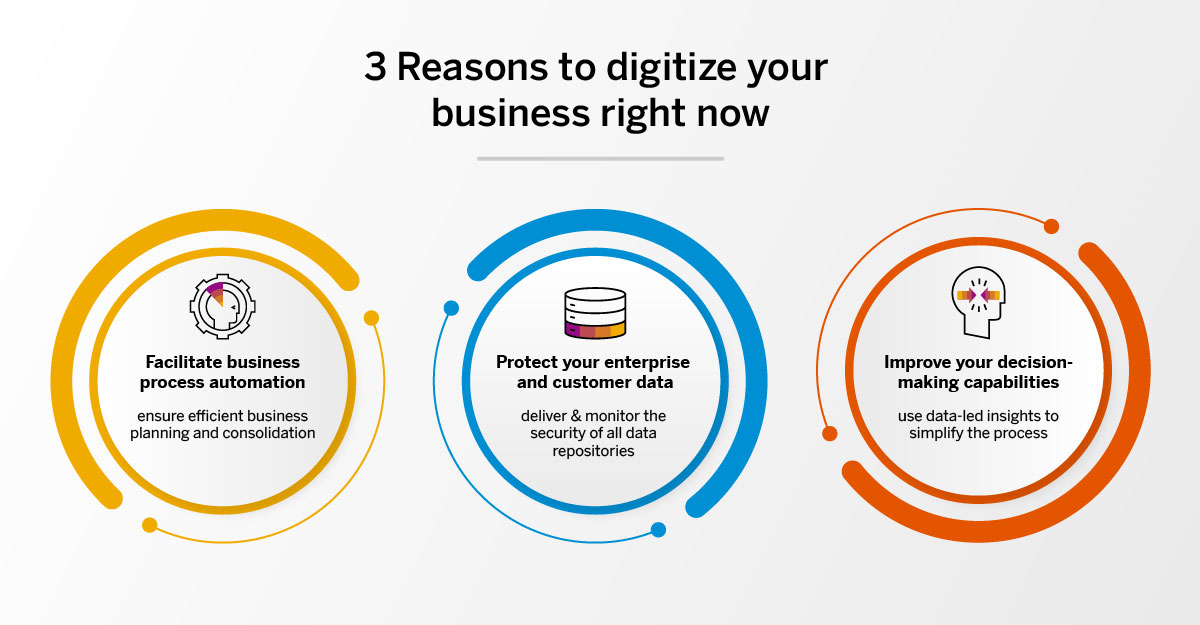The impact of COVID-19 has been felt by businesses. But it has also prompted many organizations to adopt and speed up the digitization process to survive disruptions. The pandemic fast tracked digitalization across regions and businesses in a short span of time, which would have earlier taken years. The leap has been the greatest in developed Asia, according to a McKinsey survey. And this adoption of digital technologies has been more significant in healthcare and pharma, financial services, and professional services.
If you are one of those companies who hasn’t embarked on the digital transformation journey yet, here are some interesting facts from the World Economic Forum:
- Digitalization could create up to 6 million jobs worldwide between 2016 and 2025 in the logistics and electricity industries.
- Digital initiatives in the industries we have examined could deliver an estimated 26 billion tonnes of net avoided CO2 emissions from 2016 to 2025
- Digital transformation shows a potential value opportunity of as much $100 trillion by 2025 on a cumulative basis.
Small and growing businesses, in particular, can do well to adopt digital transformation. An IDC-Cisco report showed that 72% of small businesses are accelerating digitization due to the pandemic and the need to operate a remote workforce or better engaged with customers. Leading small businesses have seen greater growth by up to eight times. So, if you have not given it a thought yet, here are three important reasons to go for it and set your business for growth in 2021 and beyond.

What is digital transformation?
Digital transformation is about implementing several operationally imperative new-age technology solutions for better business planning and consolidation. From hiring to product development, sales, marketing, and customer service, digitization can transform everything to take your business to the next level. That’s why about 96% of leaders see digital transformation as a fundamental business goal.

Facilitates business process automation
Automation uses rule-based logic to handle various operational aspects like data entry and extraction, reporting, email communication, and others in your daily business processes. It plays a critical role when you are looking at ways to ensure efficient business planning and consolidation. Comprehensive automation frees up your time and allows you to concentrate on other strategic areas of your business that need your attention. Due to such operational advantages, business process automation has caught the interest of many organizations across industries. This is evident as the global business process automation market is set to touch $19,694 million by 2026.

When you adopt and leverage the power of the right digital platform, it automates your end-to-end business process. For example, look at an Enterprise Resource Planning (ERP) software or a Robotic Process Automation (RPA) tool. These intelligent solutions can conveniently execute several repetitive and time-consuming tasks and allow you to experience these benefits:
- Do away with errors and save time: Automation significantly restricts the extent of human intervention in some critical areas of your operation to cut down errors. Plus, it saves a significant number of man-hours so that you get to utilize employee time for better collaboration and product ideation. And it holds true for all industries. For example, automation helps a technology provider witness improved productivity. At the same time, a manufacturing firm can leverage this to see both enhanced efficiency and workplace safety with limited manual job execution.
- Save on operating cost: Automation lowers your operating cost by reducing machine, system, or application downtime. For example, in a manufacturing setup, maintenance is always considered as an expensive affair. In this case, an automated predictive maintenance strategy can help you see the expected equipment breakdown and allows you to make necessary arrangements to ensure business as usual. This way, you can steer clear of production downtime.
- Ensure quality and consistency and enhance customer satisfaction: Automation assures accurate and reliable results by streamlining your performance. Thus, an automated workflow leads to a consistent product output every time. Ultimately, operational excellence enables you to offer the right solution to your customers.
- Gain a competitive edge: When you successfully manage to reduce errors, improve collaboration and productivity, you become innovative. When you combine innovation and digitization-led agility, you get to offer consistent solutions to your customers. In the end, all these will help you stay ahead of your competition. Consider this, 93% of business leaders view technology as a critical component that helps them achieve competitive advantage.
Protects your enterprise and customer data
According to the 2021 Data Breach Investigation Report by Verizon, a total of 5,258 confirmed data breaches took place across 16 different industries in the last year. These incidents have damaging effects on businesses of all sizes and domains. Organizations will have to deal with issues including loss of revenue, brand value, business opportunities, and customer trust. Additionally, it also leads to legal actions and other financial losses due to fines and penalties.
Digitization plays a major role in the process of delivering, monitoring, and ensuring the security of all data repositories in your organization. Here’s how you can go about digitization:
- Encrypt your data: Digitization encrypts your data, making it impossible for hackers to decipher. Plus, as most of today’s smart applications are hosted on the cloud, data backup happens automatically. This ensures that your data is protected, and you can access it at any point in time. It can even help you dispose of specific critical data after a certain period before it falls in the hands of cybercriminals. In simple words, you are in control of your data pertaining to daily operations, employees, and clients.
- Restrict system access: Many businesses have identified “human error” as one of the top contributing factors to data breaches. Moreover, according to Egress Insider Data Breach Survey 2021, 94% of organizations had to deal with insider data threats in the last year. However, you can efficiently deal with such issues with digitization. You can manage access permission to ensure that staff will only access the data they need to do their job. The audit trail lets you know who did what at which point in time on all your applications.
- Become security compliant: Authorities around the world are becoming highly vocal about data protection through various legislations. This makes it essential for your organization to stay compliant with different regulatory requirements with all the applicable statutes. This is especially true in the financial services industry as also healthcare. Now, with digitization, you can ensure security compliance which will safeguard your customers’ sensitive information. It helps you comply with regulations, including the European Union’s General Data Protection Regulation (GDPR), USA’s California Consumer Privacy Act (CCPA), and other region-specific laws. Plus, if you accept, transmit, or store cardholder data, irrespective of size or number of transactions, adopting the right tool makes you Payment Card Industry Data Security Standards (PCI DSS) certified.
Improves your decision-making capabilities
The advantage of strategic decision-making holds immense value for any organization. But then, it would not be easy to do so without understanding your business-critical KPIs. This is where digital transformation simplifies the process by offering you data-led insights. In this context, a business intelligence software can help you make data-driven decisions by –
- Pulling in data from all sources of your enterprise
- Aggregating them in one place for easy access and clear understanding
- Ensuring accurate reporting on various aspects of your business
- Prioritizing action points
- Making incremental changes on all required fronts
You can also leverage the massive amount of customer data stored in your systems to make informed decisions by using a Customer Data Platform (CDP) software. With a CDP application, you can integrate and unify tons of data from all key sources, including CRM, loyalty, point of sale, marketing, sales, and support, in one place. It removes duplicate data points and offers you a unified 360-degree view with all relevant information on your customers. This process consolidates and integrates customer data into one database enabling access to required insights quickly.
Armed with all these vital data, you can understand your customer journey at various stages, their preferences, and pain points. The next step is to make the right decision to roll out personalized marketing campaigns, offer customized solutions and a plethora of customer-centric activities at the right time to meet their expectations, enhance customer delight and create great customer experience.
Data forms the central part of a successful operation. Gathering, storing, processing, and observing data is crucial as it lets you know what is working for you and what is not. So, the fact that data will continue to drive your decision-making capabilities makes digitization all-important for you.
Today, customers are becoming extremely demanding. They need personalization at every stage. This is where a smart CDP platform makes sense as it allows you to offer customized solutions to them. It efficiently enables you to bring in the much-needed customer-centricity with meaningful engagement. It drives revenue by discovering hidden opportunities along with increased customer acquisition, retention, and loyalty.



